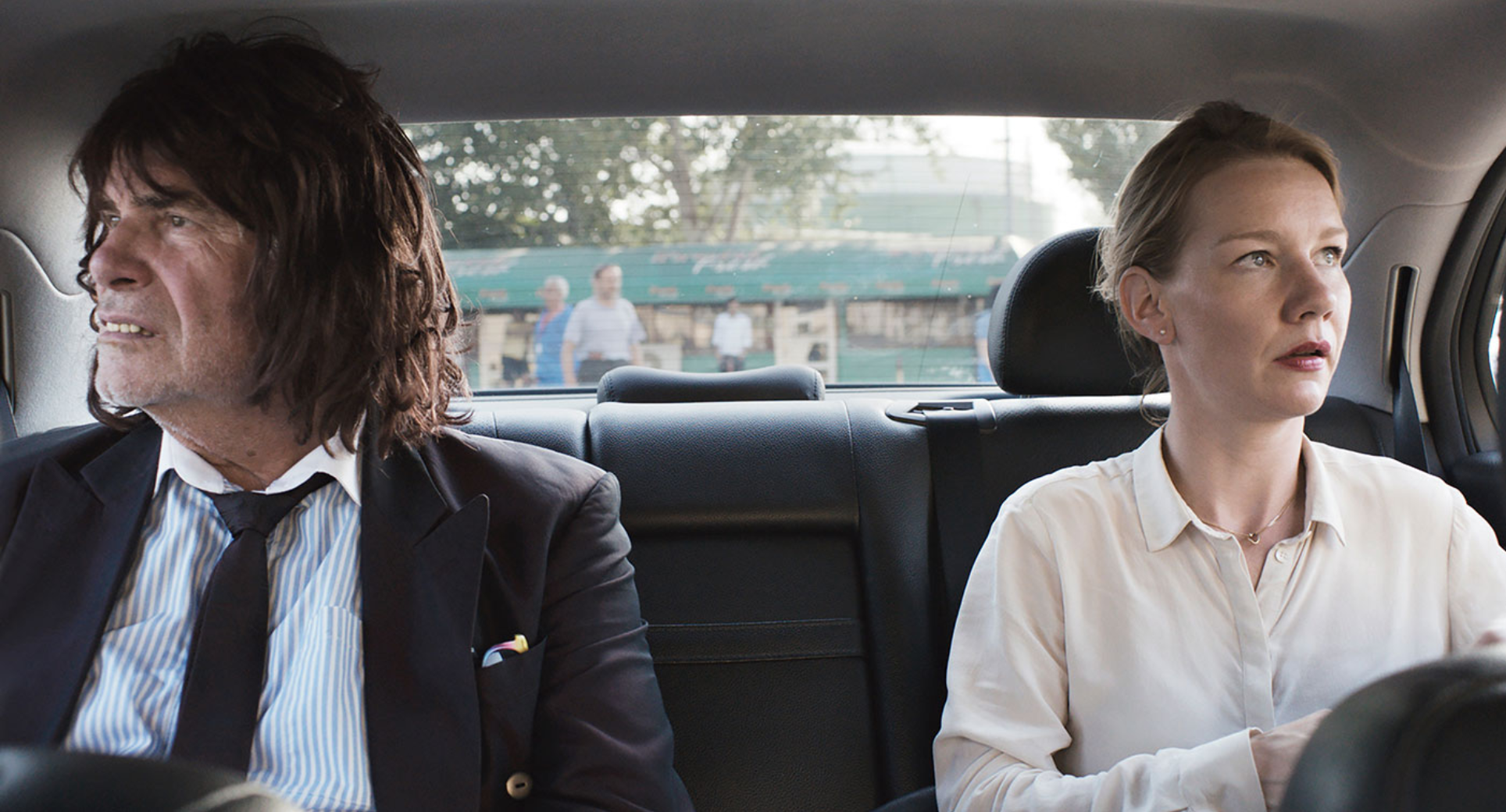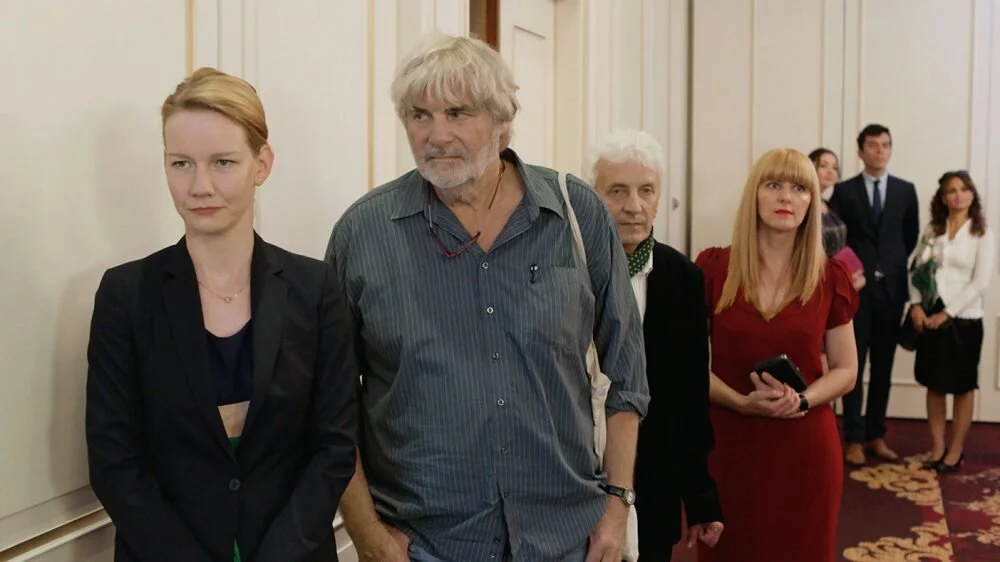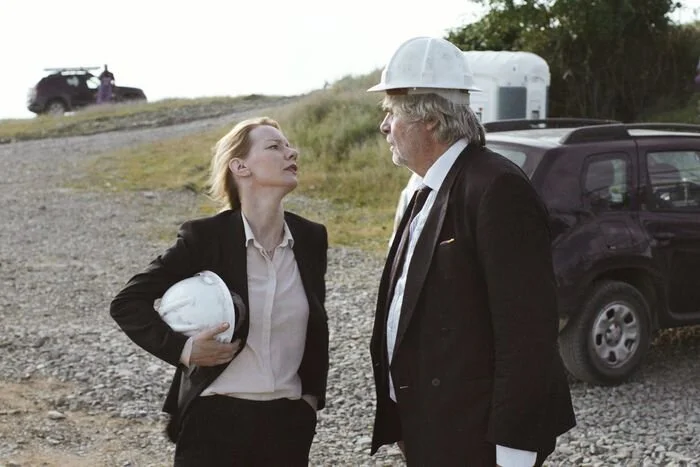Toni Erdmann, by Maren Ade
Zoárd Honéczy
Maren Ade’s Toni Erdmann is an almost three-hour long meditation on fatherhood and the (sometimes seemingly impossible) enjoyment of life. The film approaches these topics with humour, but never loses its dark undertones. Toni Erdmann is built on grand contrasts both in its mood and its characters: between serious and funny, high and low, happy and depressed.
Toni Erdmann tells the story of an unusual father-daughter relationship. The father (Winfried) is a music teacher living alone in a small German village, well-known for his sense of humour. He often creates characters to prank people, for example, acting as if the package he ordered should have been delivered to his (non-existent) brother, Toni Erdmann. His daughter (Ines) is a successful businesswoman working in Bucharest, Romania. Due to Ines’ busy schedule, the two rarely meet, and do not really know anything about each other’s lives. In an attempt to fix this, Winfried spontaneously travels to Bucharest and surprises Ines at her work. She is not very happy about this visit, as her life is extremely busy and stressful. After spending a couple of awkward and tense days together, Ines oversleeps and misses an important meeting. She blames her father for not waking her up, and after a tense argument, Winfried leaves.
Photo taken from wbur.org
However, when Ines goes to a restaurant with her friends, Winfried reappears with a wig and fake teeth, playing the character of life coach, Toni Erdmann. Ines recognizes “Erdmann'' immediately but does not reveal his true identity, as he seems to get along well with her friends. He accompanies Ines to a party, then to a business trip the following day. During their trip, Erdmann stops at the Easter celebration of a Bulgarian family and forces Ines to sing a song for them, which leads to a surprisingly electric performance. She runs off and leaves Erdmann alone. The next day, Ines holds a team building birthday party in her apartment. However, before opening the door for her first guest, she spontaneously strips naked, and declares that it is a Nacktparty (“a naked party”). The guests are shocked but play along. Suddenly, a man in a giant, hairy (traditional Bulgarian) costume arrives and amuses the guests. After realising that her father is behind the costume, Ines follows Winfried on the street and the two share a loving hug in the street. A few months later, Ines visits her father’s village for a funeral. The two talk about life and seem to have a better, but still not perfect relationship. The film ends with Ines standing alone in the garden, wearing her father’s fake teeth.
Photo taken from wbur.org
It is made clear that both protagonists of Toni Erdmann are unhappy in their current lifestyle and environment, as neither of them have real, heartfelt human relationships. Winfried is looked upon as a sort of oddball in his village, and his constant joking makes everyone (including his “close” family) uncomfortable. The best example of this is the birthday party scene, to which he arrives wearing a skeleton-makeup and jokingly chokes the man of the house, making the entire mood of the room shift negatively. However, these reactions do not discourage him from joking, as it is the only way he can make his boring life tolerable.
Ines is also unhappy, but in a completely different way. Her life is centered around her work and busy schedule - she is constantly running around, trying to fulfill every aspect of her job. Yet, she isn’t as successful as she should be - for example, her boss condescendingly asks her to take his wife shopping. Her personal life is extremely lacking. One could even say that with her lifestyle, it is impossible to have any kind of personal relationships. This is highlighted in the restaurant scene, where she tries to complain about problems and share her feelings with her (so-called) friends, who instead of reacting, immediately change the subject. Both Winfried and Ines, therefore, struggle to communicate their emotions, especially when they are together.
Winfried’s surprise visit to Bucharest proves that the two characters are complete opposites. They seem to have different views on everything: how to behave, how to start and hold a conversation, and fundamentally, how to live one’s life. All three of these are highlighted in the first half of the film. The day Winfried arrives in Bucharest, he accompanies Ines to a fancy party in a hotel, where his appearance and his jokes using fake teeth shock and alienate the guests (much to the discomfort of Ines). Winfried feels the same type of discomfort, however, when Ines exploits the resources of a massage parlour, after receiving a massage that wasn’t good enough. Their contrasting ideas on the goal of life are visible in the scene prior to the departure when neither of them can give an answer to the question: “are you happy at all”?. Their idea of life’s purpose is vastly different, yet both struggle to achieve their own version. Winfried just wants to lift the mood of people, yet makes them uncomfortable, while Ines wants to be as successful as possible in her line of work, which is obstructed by her cold persona and by her gender. When Winfried departs, both characters know that some kind of a change would be necessary.
Photo taken from vulture.com
Winfried returns as Toni Erdmann in an attempt to set Ines free of her unhappiness. Naturally, this is a difficult process. Erdmann appears whenever Ines expects it least - in a restaurant, at her office building - and actively seeks to put her in awkward positions (most notably, when Erdmann sits on a fart cushion right before greeting her and her boss). At first, this annoys Ines, but the surprisingly positive reaction of others and Erdmann’s seemingly unstoppable efforts force her to see her life from a different perspective. This slow self-realisation culminates in two cathartic scenes. Erdmann meets a Bulgarian woman, who invites them to her Easter celebration. Here, Ines is forced to paint Easter eggs and to sing a song by Whitney Houston, which ends up to be an extremely energetic performance. After this, she runs off uncomfortably - presumably, because she set her suppressed emotions free and was surprised at their amount and strength. Slammed by these feelings, she seems to lose her mind and opens the door naked to her party guests. Here, one could think about the traditional medieval German myth of Iwein, who ripped his clothes (and with that, societal pressures) off, moved to the wilderness then later reappeared as a better, reformed version of himself. Something similar happens to Ines in this sequence. She breaks off her previous cold and emotionless existence and presents to her acquaintances the most vulnerable version of herself. Then, she runs to the “wilderness” (as in, the street) and hugs his father (in the face of a wild, hairy creature), long and heartfelt. In the final scenes of the movie, the pair reunites in a funeral scene. Here, Ines seems to be somewhere in the middle of the two contrasting personas she previously appeared as. Thus, with the help of an extreme breakthrough, she was able to lighten her cold character while maintaining her professionalism. But has the duo’s relationship lost all tension?
While Winfried and Ines seem to regain the warmth of a healthy father-daughter relationship, their communication is still somewhat awkward. Winfried acts a little more comfortable around his daughter, but her replies remain short and silent. This proves that opening up is still difficult for her, but she is trying. The film ends with her wearing Winfried’s fake teeth, to which he runs to get a camera and leaves her standing alone in the garden with the fake teeth in her mouth. She eventually takes them out, with which the film highlights that she took some steps on the path towards the freedom of enjoying life, but she is not fully there yet. Standing alone and gazing ahead, Ines and the audience both realize that this is a journey we can only take by ourselves, by looking into our own souls.
Toni Erdmann is a serious yet entertaining film with many memorable moments, validating the fact that odd duos might belong together - both on screen and in real life.


